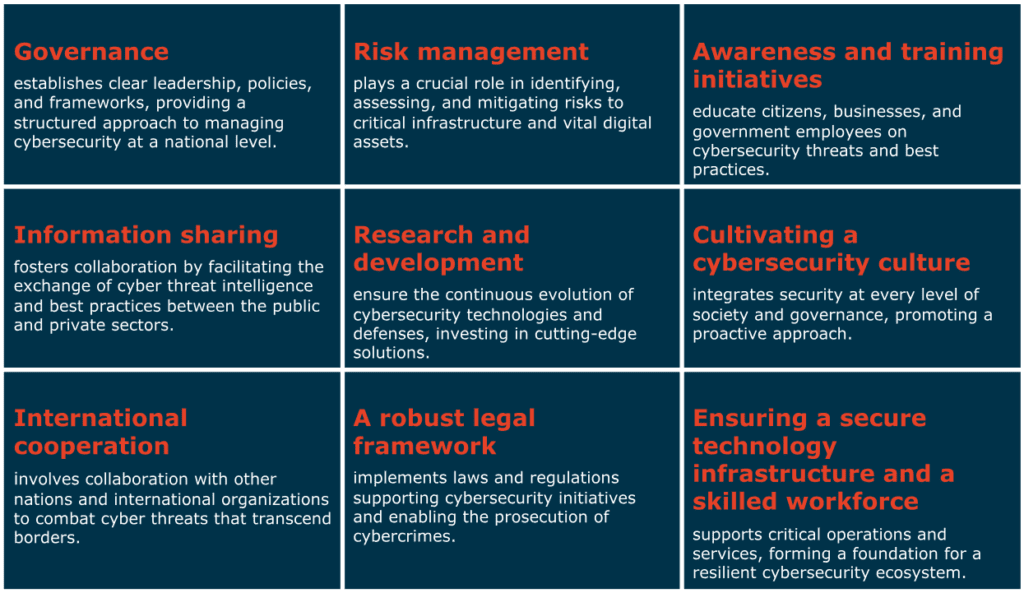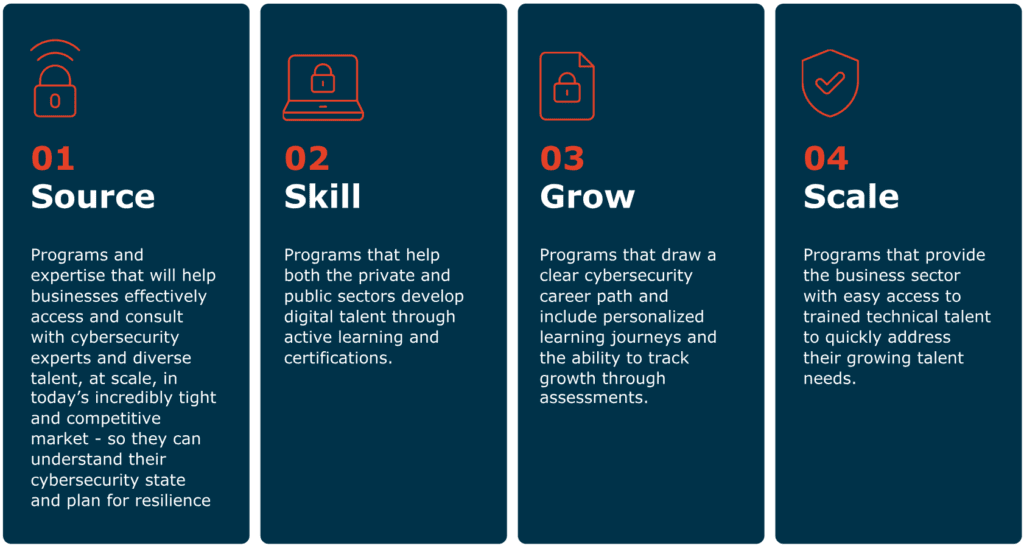ABOUT US
Cytek Security provides state-of-the-art cybersecurity solutions, delivered by the world’s top cyber experts. This includes advisory and implementation services, managed security services, and capability building.
In a world where technology’s relentless advancement brings forth both unparalleled opportunities and unprecedented risks, one issue looms over, globally: cyberattacks. These threats extend far beyond the virtual realm, impacting tangible aspects of our lives, from crippling financial losses and tarnishing reputations to disrupting critical infrastructure and essential services.
At the heart of this dynamic landscape, governments shoulder a vital responsibility in equipping their economies and citizens with the essential skills to harness the potential of emerging technologies while safeguarding against the ever-present landscape of cyber threats.
This responsibility spans every critical facet of the economy, from finance and essential infrastructure to government operations, manufacturing, commerce, and beyond.
In this article, we delve into the pivotal role of governments in developing training programs that promote a cyber-resilient nation and explore the essential elements of effective cybersecurity training programs.
Before we start, a bit about the global state of cybersecurity
In a world where the information and communication technology (ICT) sector reigns supreme, the domain of cybersecurity experiences exponential growth. Revenues within this realm nearly doubled between 2016 and 2023, surging from $83 billion to an impressive $162 billion on a global scale. Projections indicate that this figure will ascend even further, possibly reaching a staggering $257 billion by 2028. The remarkable growth prospects in cybersecurity have caught the attention of many, with some predicting that the addressable market for cybersecurity technology and services providers could ultimately reach up to $2 trillion.
Simultaneously, awareness of the imminent danger posed by cyberattacks continues to swell among business leaders and government authorities. A staggering 91% of respondents to the World Economic Forum’s Global Security Outlook Report for 2023 considered it at least somewhat likely that a catastrophic cyber event with far-reaching consequences would unfold within the next two years. Astonishingly, 43% of these respondents believed that such an event could substantially impact their business operations. The current state of geopolitical instability has only exacerbated the threat landscape, with the global economy bracing itself for a predicted $10.5 billion in damages from cybercrime by 2025. The costs of inaction in this evolving digital landscape are exceptionally high.
The shortage in cybersecurity professionals – A major roadblock to achieving national cybersecurity resilience
A nation’s cybersecurity resilience relies on several key pillars that collectively fortify its defenses and response capabilities.


Cybersecurity professionals, the human capital behind it all, are key in establishing and nurturing all the above pillars. Unfortunately, today, one of the key challenges in achieving national cybersecurity resilience is the extreme shortage of cybersecurity professionals, globally.
Although the cybersecurity field has experienced unprecedented expansion, in 2023 the cybersecurity workforce and gap have grown, as underscored by the 2023 ISC2 Cybersecurity Workforce Study. In 2023, the cybersecurity workforce has grown by 8.7%. At the same time, the gap between the number of workers needed and the number available has also continued to grow, with a 12.6% increase year over year.
The surge in cyberattacks, coupled with the scarcity of skilled professionals, serves as a catalyst for governments, municipalities, and various organizations to develop their internal capabilities. This not only fortifies security measures but also yields significant economic dividends, spanning the national, organizational, and individual levels, enabling additional businesses and initiatives.
Empowering nations’ cybersecurity resilience through cybersecurity training programs
I think it’s best to start this part of the discussion with three examples of countries that are already, quite proactively, trying to deal with building capabilities around the 3 above-mentioned pillars, dealing head-on with the shortage of cybersecurity professionals. Let’s look at three such examples:
The UK


In direct response to a 2022 report that underscored a significant cyber skills gap affecting 51% of UK businesses, the UK government unveiled a groundbreaking £2.6 billion National Cyber Strategy. The primary objective of this strategy is to bolster cyber resilience on both a national and organizational scale by channeling substantial investments into the multi-generational training of the workforce.
A centerpiece of this strategy is the ‘Upskill in Cyber’ training program, designed to provide individuals with non-cyber backgrounds with free digital training, enabling them to meet the escalating demand for cybersecurity professionals. Immediately upon its launch, the program attracted a robust response, with over 3,600 applicants. It forms part of a larger series of ambitious government initiatives, all united by a shared mission: cultivating a highly skilled workforce capable of effectively countering the ever-evolving threat landscape of cyberattacks.
Crucially, the UK government’s commitment to nurturing a cyber-resilient nation transcends the boundaries of the adult workforce. Recently announced news has highlighted the government’s commitment to equipping over 50,000 school students with free training in cyber skills through the ‘Cyber Explorers’ program. This substantial investment in young talent sets the stage for a digitally literate population that spans generations, ensuring a robust foundation for broader, more cyber-aware growth in the years to come.
The US


The United States government has embarked on an ambitious journey to fortify and expand its cyber workforce. A significant portion of this effort centers around substantial investments in training programs and the broadening of access to educational and training pathways. Within the framework of their overarching National Cybersecurity Strategy, they have recently unveiled the National Cyber Workforce and Education Strategy (NCWES), a pivotal undertaking addressing both immediate and long-term requirements of the cyber workforce.
The NCWES fundamentally recognizes the importance of robust collaboration across public and private sectors to secure the digital realm. Beyond targeting industries and cyber job vacancies for the sake of national security, this strategy actively engages educators to uplift and empower young Americans, equipping them to meet the ever-evolving demands of a dynamic technological landscape.
This strategy demonstrates a steadfast commitment to addressing the issue of diversity within the cyber workforce. It strives to foster accessible upskilling opportunities and promising career pathways for underrepresented communities.
Initiatives aimed at encouraging groups that are typically underrepresented in tech, such as women, prove invaluable in ensuring that nations not only fortify their cyber resilience but also foster diversity and catalyze the expansion of their broader digital economies.
Qatar


Qatar’s National Skilling Program, a dedicated endeavor aimed at nurturing a highly skilled digital workforce, has channeled substantial resources into bolstering cybersecurity education across diverse sectors. At its core, the program aspires to equip a staggering 50,000 individuals with advanced digital skills, including crucial cyber competencies, by the year 2025. This multifaceted initiative serves a dual purpose: propelling economic growth and safeguarding national security.
One noteworthy facet of this program, meticulously orchestrated by the Ministry of Communications and Information Technology (MCIT) in partnership with our sister company Elev8 and Microsoft, is the Qatar Digital Center of Excellence. Launched in 2022, this state-of-the-art facility stands as a beacon of excellence, offering an array of training programs essential for elevating national cyber resilience to new heights.
Additionally, Elev8 has collaboratively worked with the Qatar Ministry of Education and the National Cyber Security Agency to introduce the Cyber Eco program. This initiative specifically targets the enhancement of cyber safety awareness among schoolchildren.
Delivered to over 3,000 students across 30 different schools in Qatar, the program recognizes the heightened vulnerability of children to cyber threats, given their extensive use of digital devices. Its curriculum spans across grades 1 to 7, imparting knowledge on critical subjects such as online privacy, cyberbullying, online gaming, social media, and scams. Armed with this vital knowledge, students are empowered to discern potential cyber threats and respond appropriately, thereby fostering a safer and more cyber-aware generation.
Within the domains of the United States, the United Kingdom, and Qatar, we find compelling illustrations of governments embracing digital upskilling strategies. These initiatives are instrumental in cultivating national cyber resilience – starting with strategic planning and continuing with adept response, and swift recovery in the face of increasingly sophisticated cyberattacks.
Costa Rica


In 2022, Costa Rica faced a severe cyber crisis as a series of attacks disrupted critical government services, prompting the newly elected president to declare a national state of emergency. The extent of the attacks revealed vulnerabilities in the country’s cybersecurity infrastructure. In response, the Costa Rican government committed to developing a comprehensive national cybersecurity strategy to prevent future incidents. One of the key components of this strategic plan was national cybersecurity training, aimed to drive overall digital security improvement.
The program sought to instill a security-conscious culture and improve knowledge for better response capabilities. Hence, the program focused on building national cybersecurity capabilities, emphasizing the importance of cybersecurity awareness and strengthening the cyber-DNA of society.
A key sector identified for cybersecurity support was Agriculture. The government worked with Cytek Security and its sister company Elev8 to develop a unique capability-building model that combined cyber training with tailored consulting services, providing businesses with knowledge and support to enhance their security posture.
The examples also illustrate how imperative such programs are in growing and securing the future of digital economies. The comprehensive upskilling inherent in these initiatives not only facilitates the creation of high-paying jobs but also catalyzes the growth of the nation’s tech and cybersecurity sectors in tandem with an augmented talent pool. This, in turn, fosters the expansion of the broader economy, underscoring the symbiotic relationship between innovation, security, and economic prosperity.
A roadmap: Key governmental training programs to develop cybersecurity resilience
Cybersecurity has a strong connection with IT and technology in general. Governments looking to safeguard their cyber domains against potential threats should aim at providing a full Cybersecurity Career Progression Program – catering to both newcomers taking their first steps into the world of IT and cybersecurity, as well as seasoned professionals hungering for advanced insights and expertise.
Also, in each country, there are sectors that are inherently less technological or have less capacity or awareness for dealing with cybersecurity challenges, for example agriculture, SMBs, etc. Governments should identify these sectors and make sure to address their needs.
The high-level roadmap to building an effective cybersecurity training program lies under these 4 main themes:


Below are a few general examples of governmental training programs that were jointly delivered by YNV group brands (YNV group is our parent company) – working with governments to improve their nation’s security posture over time.
Example #1: A tailored intensive training program for recent graduates
This intensive training program is purpose-built for recent graduates and is strategically crafted to bridge the divide between academic knowledge and real-world challenges around cybersecurity. Participants are thrust into a hands-on learning environment where they grapple with simulated cyber threats mirroring actual scenarios that they will meet in their day-to-day work.
This immersive experience develops practical skills, preparing emerging professionals to meet the industry’s demands and enhancing their employability within the cybersecurity realm.
Upon completion, participants receive our accreditation, qualifying them for pivotal roles such as penetration testers, application security engineers, SOC analysts, and security engineers.
Example #2: Empowering IT professionals with skill-enhancing training
This comprehensive training program is designed to elevate the already existing expertise of IT professionals at different stages of their careers, whether they are new to the field or experienced in cybersecurity. The program provides a tailored learning path and regular evaluations and assessments that ensure that individuals are well-prepared for top-tier cybersecurity roles.
In this example, the program included the following training tracks:
- Cyber StepUP (Foundations): Ideal for IT professionals new to the cybersecurity domain.
- Cyber Guards (Intermediate): Tailored for cybersecurity professionals looking to advance their skills.
- Industry-Focused Workshops: Targeted at managers and leaders in various functions.
- Industry Cyber Specialized: Designed for experienced cybersecurity professionals seeking specialization.
Example #3: Training for organizational leaders and managers
This program includes a specialized curriculum that is thoughtfully curated for leaders and managers within organizations, delving deep into the latest cybersecurity trends, and providing C-level executives and department heads with invaluable insights and strategies to fortify their organizations and lead secure digital transformations.
Summary
Cybersecurity training programs that help governments deal with the acute shortage in cybersecurity professionals, and with creating a more cyber-aware population, are imminent for growing and securing digital economies. Such programs also help governments build robust cybersecurity infrastructure and nurture a cyber-aware culture that trickles through the entire population.
It is important though to select the right training partner for this journey. Some important things to look for are:
- The secret sauce: Practical cybersecurity AND training expertise – This combination is hard to come by. Yes, extensive expertise in delivering training programs is important, but when it comes to cybersecurity training, it’s highly important that the selected partner also has extensive hands-on expertise in practicing cybersecurity, delivering and operating projects in this highly dynamic industry. At Cytek for example, we have extensive expertise delivering national CERTs, designing, building and operating SOCs, and advising enterprises and governments around their security posture. Combining this strong expertise with the training delivery expertise of Elev8, our sister company, is the unique combination, the secret sauce that ensures our training programs are always relevant and keep up with the rapidly changing cyber-threat landscape.
- Robust infrastructure for effective tech learning – The appropriate environment, both virtual and physical, is critical for the success of cybersecurity training programs. When it comes to cybersecurity training, these infrastructures should include cybersecurity education labs, both virtual and physical ones. The labs are critical for the ability to educate learners on essential cybersecurity concepts as well as enable secure hands-on practice around a range of topics, from network scanning to intrusion detection and penetration testing. Another important infrastructure is the availability of physical Tools, including physical hardware and software that can be used to build networks with servers, firewalls, and intrusion detection systems, creating a realistic cybersecurity environment.
- Wide experience in training operational models and methodologies – including an emphasis on agile learning processes and a lifelong learning approach that nurtures learners’ curiosity and encourages continuous growth and individual learning over time. Cybersecurity is a rapidly changing field, and learning must continue over time.
If you want to learn more about the Cytek-Elev8 capabilities of Cytek Security and Elev8 in delivering cybersecurity training programs, please contact us.





